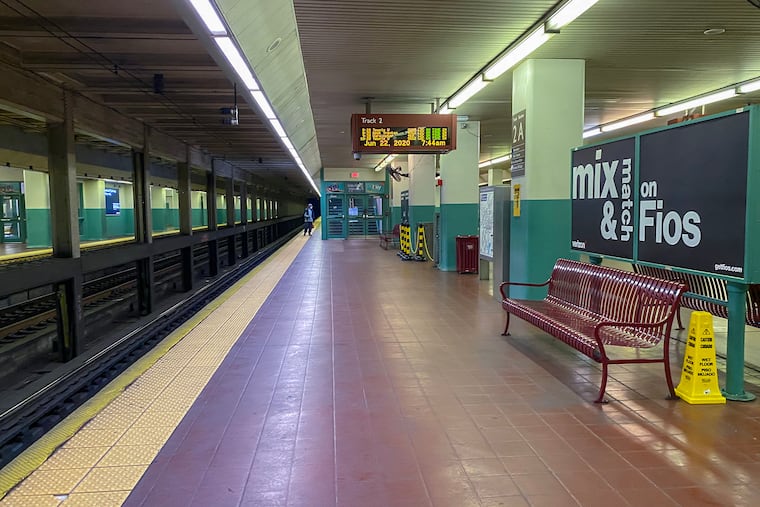SEPTA threatens to cut Regional Rail lines, pull back subway and trolleys in next decade if Harrisburg doesn’t boost funds
“Once you stop the system, it’s not just something you can turn back on like a light switch,” said SEPTA General Manager Leslie Richards.

SEPTA is warning that over the next decade, it will be forced to slash Regional Rail lines, eliminate dozens of stations, pull back subway service, and convert trolley routes into bus routes unless Pennsylvania officials find a way to resolve its budget crisis.
SEPTA General Manager Leslie S. Richards painted a doomsday-like portrait in testimony before the Pennsylvania House Transportation Committee on Wednesday morning, discussing the “devastating” financial impacts of COVID-19 as well as challenges that existed long before the pandemic.
“Once you stop the system, it’s not just something you can turn back on like a light switch,” Richards said during the virtual testimony, which lasted more than an hour. “We just want everybody to understand that, and so, if that’s the direction that we have to go in, it is going to impact the recovery of everyone, because we support businesses that are also trying to recover that are also in very hard times.”
A “service reduction plan” over the next 10 years would turn city trolley routes, as well as the Sharon Hill Line, into bus lines; eliminate the Chestnut Hill East, Chestnut Hill West, Cynwyd, and Fox Chase Regional Rail Lines; cut more than 100 stations on the nine remaining Regional Rail lines; suspend service on the Broad-Ridge Spur; reduce frequency on the Broad Street and Market-Frankford Lines; and limit service on the Norristown High Speed Line.
Since the passage of Act 89 in 2013, the Pennsylvania Turnpike Commission has been required to send $450 million annually to PennDot to help support public transit. Of that, SEPTA sees about $178 million in quarterly $44.5 million payments.
The turnpike’s obligation, however, drops to $50 million in 2022, with the remaining responsibility falling on the state’s General Fund. The issue grew more complicated by the pandemic, as low traffic sent turnpike revenues plunging.
The turnpike delayed payment to PennDot in July, and future payments are uncertain. PennDot can commit to giving SEPTA $97 million in capital funds from the turnpike and other sources from a budgeted $349 million this fiscal year, according to Richards’ written testimony shared with The Inquirer. SEPTA’s fiscal year began July 1.
“We have identified $250 million in capital projects — this includes bridges, station accessibility, electric bus procurements — that will need to be stopped or delayed,” Richards testified. “This will impact jobs and economic activity, and both of these are greatly needed in this area.”
In June, SEPTA approved a $1.53 billion operating budget for the fiscal year, with $481 million from passenger revenue and $780 million from state subsidies.
Port Authority of Allegheny County CEO Katharine Kelleman, Pennsylvania Public Transportation Association board chairperson Robert Fiume, and others joined Richards Wednesday as the committee convened for the public hearing on a transportation task force bill package originally scheduled for the spring.
In the written testimony, Richards, a former Montgomery County commissioner and PennDot secretary, commended bills that would shift the turnpike’s obligations to the Motor Vehicle Sales and Use Tax, empower local governments to invest in transportation, and “limit the diversion of Motor License Funds from highway, road and bridge projects.”
The testimony bore similarities to warnings made before the passage of Act 89 in 2013, when then-General Manager Joseph Casey threatened to cut nine Regional Rail lines and shorten two others, shutter a subway line, and substitute buses for trolleys.
But the pandemic has elevated challenges “to a new urgency level,” Richards told The Inquirer after Wednesday’s hearing.
SEPTA Board Chairman Pasquale T. “Pat” Deon Sr., who is also a turnpike commissioner, stressed the need for political support across the commonwealth in a prerecorded video played to the group Wednesday.
Deon is a vital force at the transit authority, where he holds sway over Pennsylvania Republicans who control both chambers of the Legislature. Republicans aren’t typically as keen to invest in mass transit as the colleagues across the aisle.
“If [public transportation]‘s a priority, we would expect that Harrisburg would treat it as such,” Deon said. “If you don’t want to do that, and Harrisburg treats it as something down the priority line, I’m not sure we open up, and the economy comes back. But it’s really your choice.”
» READ MORE: SEPTA poised to shift to Democrats’ control for first time in its history
The authority racked up $124 million in revenue losses from March through June as ridership dropped by 92% on buses, subways, and trolleys and 98% on Regional Rail.
But the commutes that riders relied on just months ago may not come back. SEPTA, now losing about $1 million daily, expects fare revenue to stay low for the next couple of years.
“People can see that they don’t need to be in a Center City business environment five days a week to get their work done anymore,” Richards told Rep. Mike Carroll (D., Lackawanna-Luzerne). “We’re not really sure what that looks like for our full ridership, but it doesn’t look like it’s going to come back to pre-COVID levels anytime soon for sure, and maybe never.”
SEPTA received $644 million in CARES Act funding to stem pandemic operating losses. The authority “will have expended or committed 20%” of the funds in less than three months, according to the testimony.
Last month, Richards joined transit leaders to call for additional billions in federal relief.
“Along with cutting routes, along with shrinking fleets, along with closing stations,” Richards said, “reducing staff levels will be an option we’ll be looking at.”